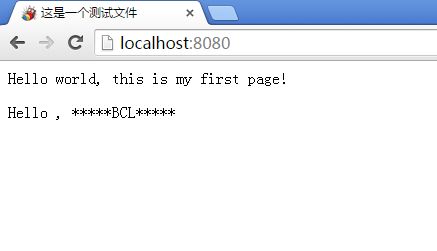使用golang的标准库搭建网站--3.模板函数
和大多数语言的的模板语法类似:{{.Name | FuncName}}
go本身自带了一些模板函数,我们现在来看一看如何自定义模板函数:
先来看一个函数声明:
func (t *Template) Funcs(funcMap FuncMap) *TemplateFuncs函数就是用来创建我们模板函数的函数了,它需要一个FuncMap类型的参数,继续看手册
type FuncMap map[string]interface{}官方文档里是这么解释的
FuncMap is the type of the map defining the mapping from names to functions. Each function must have either a single return value, or two return values of which the second has type error. In that case, if the second (error) argument evaluates to non-nil during execution, execution terminates and Execute returns that error.
简单翻译一下就是
这是一个map,是名称与函数的映射,其中key对应的就是你在模板中使用的函数名称,不一定要和你在源代码文件
中定义的函数名同名,需要注意的是这个map的value,它是一个interface{}类型的,但实际上应该给它一个
指定类型的函数名,这个函数是这样的:
func functionName(args ...interface{}) string你也可以有第二个返回值,但必须是error类型的。如果函数执行没有出错,那这个值必须是nil,
我们来看一下具体的使用方法:
func Index(w http.ResponseWriter, r *http.Request) {
//用于保存数据的map
data := make(map[string]string)
//保存模板函数
tempfunc := make(template.FuncMap)
tempfunc["ShowName"] = ShowName
t, _ := template.ParseFiles("index.html")
//注册模板函数
t = t.Funcs(tempfunc)
data["Name"] = "BCL"
t.Execute(w, data)
}
//这个示例函数,将传进来的字符串用*****包起来
func ShowName(args ...interface{}) string {
//这里只考虑一个参数的情况
var str string = ""
if s, ok := args[0].(string); ok {
str = "*****" + s + "*****"
} else {
str = "Nothing"
}
return str
}如果这么写的话,似乎看上去并没有什么问题,并且编译能通过,
打开浏览器访问,发现似乎除了问题:
[4]
并且出现了以下的错误:
2015/07/22 22:38:07 http: panic serving 127.0.0.1:37346: runtime error: invalid memory address or nil pointer dereference
goroutine 5 [running]:
net/http.func·011()
/opt/go/src/net/http/server.go:1130 +0xbb
html/template.(*Template).Funcs(0x0, 0xc20803af30, 0x1)
/opt/go/src/html/template/template.go:276 +0x1f
main.Index(0x7fda0d28a278, 0xc20804cc80, 0xc208032d00)
/home/buchenglei/workspace/golang/src/test/test.go:18 +0x121
net/http.HandlerFunc.ServeHTTP(0x7cee28, 0x7fda0d28a278, 0xc20804cc80, 0xc208032d00)
/opt/go/src/net/http/server.go:1265 +0x41
net/http.(*ServeMux).ServeHTTP(0xc20803aa20, 0x7fda0d28a278, 0xc20804cc80, 0xc208032d00)
/opt/go/src/net/http/server.go:1541 +0x17d
net/http.serverHandler.ServeHTTP(0xc208070060, 0x7fda0d28a278, 0xc20804cc80, 0xc208032d00)
/opt/go/src/net/http/server.go:1703 +0x19a
net/http.(*conn).serve(0xc20804cbe0)
/opt/go/src/net/http/server.go:1204 +0xb57
created by net/http.(*Server).Serve
/opt/go/src/net/http/server.go:1751 +0x35e
需要改写模板解析的函数
func Index(w http.ResponseWriter, r *http.Request) {
//用于保存数据的map
data := make(map[string]string)
tempfunc := make(template.FuncMap)
tempfunc["showname"] = ShowName
//得给模板起个名字才行
t := template.New("index.html")
t = t.Funcs(tempfunc)
t, _ = t.ParseFiles("./index.html")
data["Name"] = "BCL"
t.Execute(w, data)
}注意
如果待输出到模板中的字符串是一个html片段的话,它是会被转义的,解决办法就是用template.HTML()将html片段包裹起来,再送到模板中解析,这样就能保证html代码被浏览器正确执行。
